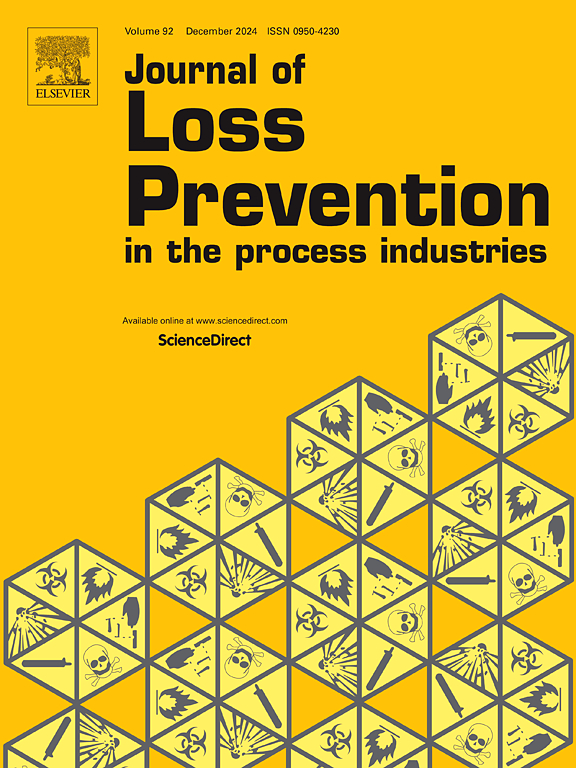油库风险评估中的不确定性管理:当前方法、挑战和未来方向
IF 4.2
3区 工程技术
Q2 ENGINEERING, CHEMICAL
Journal of Loss Prevention in The Process Industries
Pub Date : 2025-06-14
DOI:10.1016/j.jlp.2025.105711
引用次数: 0
摘要
本文对油库风险评估中的不确定性管理进行了系统回顾和前瞻性分析。目前的研究表明,动态风险评估已成为油库风险评估的主导方法,能够有效识别风险波动,提供动态风险预警和决策支持。鉴于油库在国家能源基础设施中的关键作用,确保其可靠性和安全性对于维护能源安全至关重要。然而,在解决认知和认知不确定性方面仍然存在重大挑战。现有的方法通常依赖于模糊逻辑和专家启发来管理认知不确定性,然而专家之间的主观性和可变性会在权重分配中引入不确定性,从而潜在地破坏决策的准确性。未来的研究应该研究模糊认知地图和数据驱动的方法来减轻这些影响。对于选择性不确定性,虽然传统的概率统计被广泛使用,但需要进一步的发展来提高计算效率和准确性。有希望的解决方案包括灰色系统理论、贝叶斯网络和多源信息融合技术,这些技术为处理选择性不确定性提供了改进的方法。制定健全的风险评估框架对于保护能源基础设施、确保能源供应的连续性和防止灾难性故障至关重要。未来的研究应着眼于全面的不确定性管理框架,提高数据质量,并将物联网(IoT)和人工智能技术相结合,以提高油库风险评估的科学严谨性和可靠性。这些进步不仅将加强运行安全,还将确保能源安全的长期稳定。本文章由计算机程序翻译,如有差异,请以英文原文为准。
Uncertainty management in oil depot risk assessment: Current approaches, challenges, and future directions
This paper presents a systematic review and forward-looking analysis of uncertainty management in oil depot risk assessments. Current research underscores that dynamic risk assessment has become the dominant method for evaluating oil depot risks, enabling effective identification of risk fluctuations and providing dynamic risk warnings and decision support. Given the critical role of oil depots in national energy infrastructure, ensuring their reliability and safety is essential for safeguarding energy security. However, significant challenges persist in addressing cognitive and aleatory uncertainties. Existing approaches often rely on fuzzy logic and expert elicitation to manage cognitive uncertainty, yet the subjectivity and variability among experts can introduce uncertainties in weight assignments, potentially undermining decision accuracy. Future studies should investigate fuzzy cognitive maps and data-driven methods to mitigate these effects. For aleatory uncertainty, while conventional probability statistics are widely used, further advancements are required to enhance computational efficiency and accuracy. Promising solutions include grey system theory, Bayesian networks, and multi-source information fusion techniques, which offer improved approaches for handling aleatory uncertainty. Developing robust risk assessment frameworks is crucial for protecting energy infrastructure, ensuring the continuity of energy supply, and preventing catastrophic failures. Future research should focus on comprehensive uncertainty management frameworks, improved data quality, and the integration of Internet of Things (IoT) and artificial intelligence technologies to enhance the scientific rigor and reliability of oil depot risk assessments. These advancements will not only bolster operational safety but also ensure the long-term stability of energy security.
求助全文
通过发布文献求助,成功后即可免费获取论文全文。
去求助
来源期刊
CiteScore
7.20
自引率
14.30%
发文量
226
审稿时长
52 days
期刊介绍:
The broad scope of the journal is process safety. Process safety is defined as the prevention and mitigation of process-related injuries and damage arising from process incidents involving fire, explosion and toxic release. Such undesired events occur in the process industries during the use, storage, manufacture, handling, and transportation of highly hazardous chemicals.

 求助内容:
求助内容: 应助结果提醒方式:
应助结果提醒方式:


